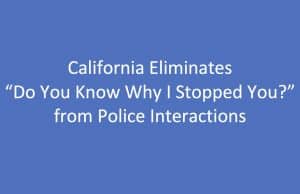Transforming Traffic Stops: California’s New Approach Eliminates “Do You Know Why I Stopped You?”
Recently, California instituted a groundbreaking policy altering the dynamics of police-citizen interactions during traffic stops. As of January 2024, California officers must not ask individuals why they were pulled over. In fact, the cop must state why they pulled you over. We will delve into the nuances of this regulatory change, exploring its impact on law enforcement interactions and the rights of individuals during traffic stops.
Traffic stops have long been focal points of discourse surrounding police-citizen interactions. Historically, officers routinely inquired about the reason for the stop, often yielding varied responses that could influence the trajectory of the encounter. Recognizing the need for clearer guidelines to protect individual rights, California’s new policy seeks to eliminate this question during traffic stops. By removing the question about why someone was pulled over, the policy aims to minimize potential misunderstandings, reduce subjective judgments, and foster a more transparent and equitable interaction between law enforcement and the public. This adjustment empowers drivers to understand and exercise their rights without feeling compelled to offer potentially self-incriminating information.
In Minnesota, officers must have reasonable suspicion of criminal activity to make a traffic stop. Expanding the scope of that stop for a further intrusion also requires reasonable suspicion and in some situations probable cause. A common tactic of police officers in Minnesota and across the country is to immediately ask the driver why they got pulled over, hoping to elicit an incriminating response. When the officer gets someone to admit “I’m drunk…I know I shouldn’t be driving” or simply “I was speeding”, then that is gold for them in court, especially if the statement is recorded up close and personal on a body worn camera video. Eliminating that incriminating-eliciting (too many -ing words) tactic from the cop’s playbook in California, will make the encounter fairer.
Instead of cat-and-mouse games, the California officer must state the reason why the person was pulled over. Every state should implement this. Why shouldn’t a police officer have to state why they pulled you over? If your freedom is being restricted, isn’t it only fair? Surely, there are opposing viewpoints that believe a policy like that takes away from an officers’ ability to efficiently gather information. But let’s prioritize transparency. The goal should be a more equitable and respectful interaction between law enforcement and the public. Our nation’s history is anything but that. Sure, both sides can be better in that regard. But it is the government actors, the law enforcement arms, those taking away life and liberty that should first show ways to make the process more peaceful.
Robert H. Ambrose is a criminal defense lawyer and DWI attorney in Minnesota. Super Lawyers named him Super Lawyer the past three years and a Rising Star the previous six years. He is an adjunct professor at the University of Minnesota Law School. DWI Lawyer Woodbury MN, Criminal Defense Attorney Minneapolis MN, Criminal Attorney Minnesota.

